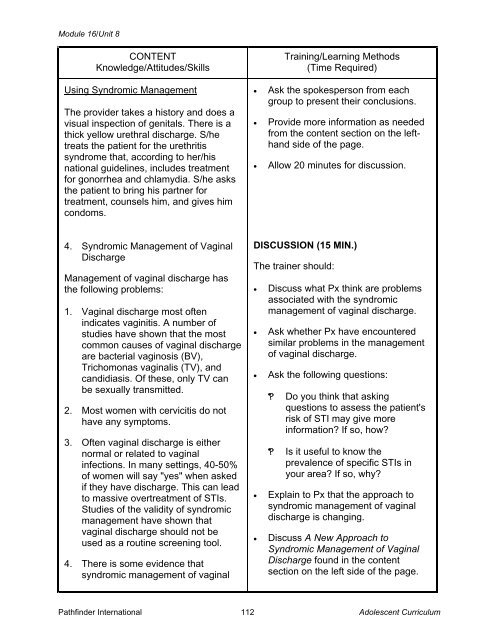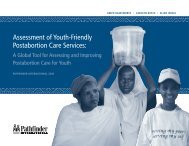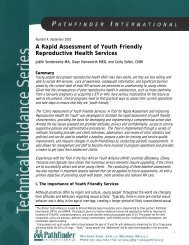reproductive health services for adolescents - Pathfinder International
reproductive health services for adolescents - Pathfinder International
reproductive health services for adolescents - Pathfinder International
You also want an ePaper? Increase the reach of your titles
YUMPU automatically turns print PDFs into web optimized ePapers that Google loves.
Module 16/Unit 8<br />
CONTENT<br />
Knowledge/Attitudes/Skills<br />
Using Syndromic Management<br />
The provider takes a history and does a<br />
visual inspection of genitals. There is a<br />
thick yellow urethral discharge. S/he<br />
treats the patient <strong>for</strong> the urethritis<br />
syndrome that, according to her/his<br />
national guidelines, includes treatment<br />
<strong>for</strong> gonorrhea and chlamydia. S/he asks<br />
the patient to bring his partner <strong>for</strong><br />
treatment, counsels him, and gives him<br />
condoms.<br />
Training/Learning Methods<br />
(Time Required)<br />
• Ask the spokesperson from each<br />
group to present their conclusions.<br />
• Provide more in<strong>for</strong>mation as needed<br />
from the content section on the lefthand<br />
side of the page.<br />
• Allow 20 minutes <strong>for</strong> discussion.<br />
4. Syndromic Management of Vaginal<br />
Discharge<br />
Management of vaginal discharge has<br />
the following problems:<br />
1. Vaginal discharge most often<br />
indicates vaginitis. A number of<br />
studies have shown that the most<br />
common causes of vaginal discharge<br />
are bacterial vaginosis (BV),<br />
Trichomonas vaginalis (TV), and<br />
candidiasis. Of these, only TV can<br />
be sexually transmitted.<br />
2. Most women with cervicitis do not<br />
have any symptoms.<br />
3. Often vaginal discharge is either<br />
normal or related to vaginal<br />
infections. In many settings, 40-50%<br />
of women will say "yes" when asked<br />
if they have discharge. This can lead<br />
to massive overtreatment of STIs.<br />
Studies of the validity of syndromic<br />
management have shown that<br />
vaginal discharge should not be<br />
used as a routine screening tool.<br />
4. There is some evidence that<br />
syndromic management of vaginal<br />
DISCUSSION (15 MIN.)<br />
The trainer should:<br />
• Discuss what Px think are problems<br />
associated with the syndromic<br />
management of vaginal discharge.<br />
• Ask whether Px have encountered<br />
similar problems in the management<br />
of vaginal discharge.<br />
• Ask the following questions:<br />
Do you think that asking<br />
questions to assess the patient's<br />
risk of STI may give more<br />
in<strong>for</strong>mation If so, how<br />
Is it useful to know the<br />
prevalence of specific STIs in<br />
your area If so, why<br />
• Explain to Px that the approach to<br />
syndromic management of vaginal<br />
discharge is changing.<br />
• Discuss A New Approach to<br />
Syndromic Management of Vaginal<br />
Discharge found in the content<br />
section on the left side of the page.<br />
<strong>Pathfinder</strong> <strong>International</strong><br />
112<br />
Adolescent Curriculum
















